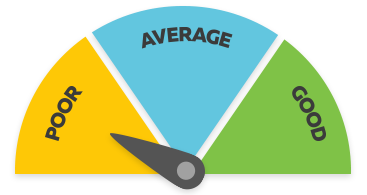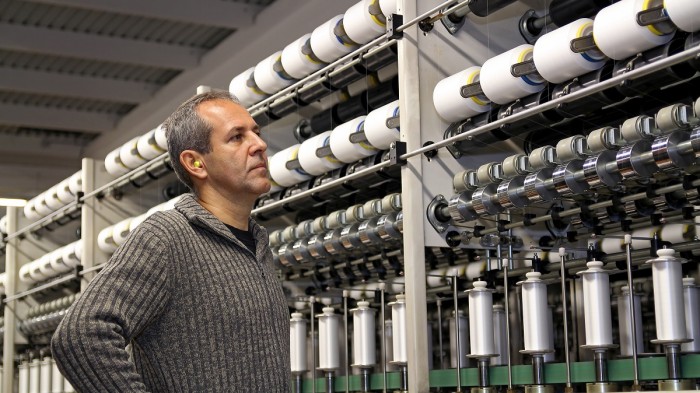Textile Process Operator
Kaimahi Kaka-aku
Alternative titles for this job
Textile process operators carry out a variety of tasks in the production of materials such as fabric, canvas, yarn and carpet.
Pay
Textile process operators usually earn
$24 per hour
Source: careers.govt.nz research, 2018.
Job opportunities
Pay
Textile process operators usually start on minimum wage.
Source: careers.govt.nz research, 2018.
- PAYE.net.nz website - use this calculator to convert pay and salary information
- Employment New Zealand website - information about minimum wage rates
(This information is a guide only. Find out more about the sources of our pay information)
What you will do
Textile process operators may do some or all of the following:
- weave or knit fabrics, clothes and carpets
- operate the machinery used to make textiles
- wash and blend wool, yarn or cloth
- check the quality of products
- spin wool or other fibres to make yarn
- dye or bleach materials
- glue or weld fabric together
- press, stretch or waterproof materials.
Skills and knowledge
Textile process operators need to have knowledge of:
- textiles and the products being made
- welding, weaving, sewing and knitting methods
- safety regulations
- quality control methods
- how to maintain and operate machinery.
Working conditions
Textile process operators:
- usually work regular hours, but may sometimes work overtime
- work in factories in conditions that may be hazardous or noisy.
Entry requirements
There are no specific requirements to become a textile process operator, as you gain skills on the job.
Textile process operators may complete Level 4 or Level 5 New Zealand Certificates in Dyeing and Finishing, Textile Machine Setting, Textile Manufacturing and Industrial Textile Fabrication while working.
- Competenz website - textile manufacturing qualifications
- MITO website - industrial textile fabrication qualifications
Secondary education
A minimum of three years of secondary education is recommended. Useful subjects include construction and mechanical technologies, maths and processing technologies.
Personal requirements
Textile process operators need to be:
- able to follow instructions
- accurate and careful
- patient
- quick and alert
- able to work well in a team
- responsible
- practical.
Useful experience
Useful experience for textile process operators includes:
- factory work
- mechanical engineering work
- sewing experience.
Physical requirements
Textile process operators need to be reasonably fit and strong and have good hand-eye co-ordination.
Find out more about training
- Competenz
- 0800 526 1800 - www.competenz.org.nz
- MITO
- 0800 88 21 21 - www.mito.org.nz
What are the chances of getting a job?
Chances of getting a job as a textile process operator are poor as it is cheaper to make textiles overseas and most textiles are now made by machines.
Global demand for synthetic textiles instead of wool has also meant less demand for textile process operators.
Many textile production factories have closed or reduced their staff numbers.
According to the Census, 1,200 textile process operators worked in New Zealand in 2018.
Types of employers varied
Textile process operators can work for a variety of companies such as:
- carpet manufacturers
- synthetic textile manufacturers
- natural textile manufacturers
- canvas and plastic fabricators
- yarn manufacturers.
Sources
- Doyle, K, 'Made in NZ Tag could be 'Lost Forever' by 2020', 10 May 2018, (www.radionz.co.nz).
- Hutching, G, 'Wool Fights Back in Global Campaign to Combat Synthetics', 6 October 2017, (www.stuff.co.nz).
- Infometrics, 'From Education to Employment: Megatrends Report', 26 June 2018,(www.infometrics.co.nz).
- Keene, P, chief operating officer, TMC, careers.govt.nz interview, August 2018.
- Ministry of Business, Innovation and Employment, 'Beyond Commodities: Manufacturing in the Future' 2018, (www.mbie.govt.nz).
- Ministry of Primary Industries, 'Situation and Outlook for Primary Industries March 2017', March 2017, (www.mpi.govt.nz).
- Stats NZ, '2018 Census Data', 2019.
(This information is a guide only. Find out more about the sources of our job opportunities information)
Progression and specialisations
Textile process operators may progress to work in design or product development, or move into management roles.
Textile process operators may specialise in:
- carding
- carpet making
- dyeing and finishing
- knitting
- machine setting
- tufting
- welding.
Last updated 25 March 2025


